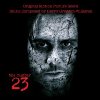Visit the Movie Wave Store | Movie Wave Home | Reviews by Title | Reviews by Composer | Contact me
THE NUMBER 23
Effective thriller score is something of a return to form
A review by JAMES SOUTHALL
Music composed by
HARRY GREGSON-WILLIAMS
Rating
* * *


Performed
by
THE HOLLYWOOD STUDIO SYMPHONY
led by
ENDRE GRANAT
conducted by
ARNOLD CRUST
Orchestration
LADD MACINTOSH
Engineered by
MALCOLM LUKER
Music Editor
ADAM SMALLEY
Produced
by
HARRY GREGSON-WILLIAMS
Album running time
44:31
Released by
SILVA SCREEN
Catalog number
SILCD1230
Album cover copyright (c) 2007 New Line Records; review copyright (c) 2007 James Southall
It isn't long since I became rather enthusiastic about the prospects for Harry Gregson-Williams, the first major composer to really break away from Hans Zimmer's factory and set himself up on his own terms who actually seemed to be any good. Since then, John Powell has emerged and blossomed to a degree which few would have predicted, and Gregson-Williams has seemed to be falling down a slippery slope, with even his better scores (like Kingdom of Heaven) still not seeming to be quite what they could have been, and his worse ones (like the recent Deja Vu) bordering on the repulsive.
It is pleasing, therefore, that he seems to have arrested the slide and come up with a satisfying (if not exactly original) thriller score for Joel Schumacher's latest opus, The Number 23, about a man who reads a book which seems to be about his own life, and embarks on a paranoic obsession with the number 23. Schumacher seems to have regained some of the dignity he lost with his embarrassments of the late 1990s, with some reviews even calling his new film "not that bad" - rare praise indeed.
This type of taut thriller provides a good opportunity for a composer to write enveloping, awkward, uncomfortable music, and that's exactly what Gregson-Williams does. The opening title piece - while seemingly owing rather a lot to Michael Giacchino's Lost music - is dark and restrictive, like a noose gradually tightening. It's the usual meld of orchestra and electronics, thankfully with a rather greater contribution from the former than has been the composer's tendency of late. There's some sampled female wailing, but even that is done in such a way as to be rather effective. The second cue, "Fingerling's Childhood", contains some warmth in its gentle theme, but that's about it for the score, whose remaining tone is set in the lengthy piece which follows, "Suicide Blonde", agitated strings and sampled percussion cranking up the tension very effectively.
The composer uses devices throughout which usually I would find highly-irritating - those sampled vocals, the drum loops, the electronic manipulation of the orchestra, the curious middle eastern tinge provided by the ethnic flutes - but he really pulls them together well, in a way that sounds quite fresh, and weaves a compelling soundscape as a result. Perhaps the finest cue is the finale, "Atonement", which has a kind of tragic sweep to it which is very impressive. The album isn't exactly the kind of thing I can imagine too many people playing very frequently, but it does its job well and doesn't outstay its welcome.
Tracks
- Opening Titles (3:54)
- Fingerling's Childhood (3:05)
- Suicide Blonde (7:34)
- Ned (3:00)
- 11:12pm (4:02)
- Finishing the Book (9:03)
- Laura Tollins (3:20)
- Room 23 (5:37)
- Atonement (4:56)
